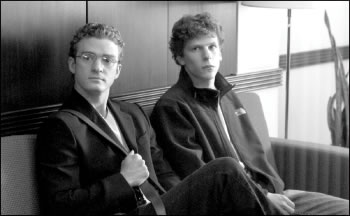BY Ed Koch
“The Social Network” (+)
This docudrama has been hailed as a picture that is on its way to becoming a cult film. I agree. The script is based on a book “The Accidental Billionaires” by Ben Mezrich — and a brilliant screenplay by Aaron Sorkin. The incidents stated as facts are subject to libel laws and, so far as I know, no one has disputed them.
The central figure is currently the principal owner and founder of Facebook, Mark Zuckerberg (Jesse Eisenberg), who is currently the youngest billionaire on the planet. We meet him at Harvard where he uses his computer to embarrass his girlfriend, Erica (Rooney Mara), who has just ended their relationship. He smears her by calling her a bitch on his blogs and then posts photos of sorority girls stating who is hot and not. Out of that comes an idea, not yet clear in his nerdy mind. A precursor to Facebook.
Mark’s computer genius is recognized by two young socialite campus guys who are also on the Harvard crew team: identical twins Tyler and Cameron Winklevoss (both played by Armie Hammer). They hire him to develop their idea, also a progenitor to Facebook, and later sue him for stealing their proposal. Another suit is later brought by Mark’s close friend, Eduardo Saverin (Andrew Garfield), whom Mark hired as chief financial officer of Facebook — splitting ownership of the new business 70-30 percent (with Mark to have the lion’s share).
Through flashbacks and a pre-trial proceeding at which all of the suing parties and their lawyers appear, all of the contract breaches that allegedly occurred on the part of Mark are laid out. They were primarily aided and abetted by the well-known Sean Parker, co-creator of Napster (remember free music?). Parker is superbly portrayed by Justin Timberlake.
The flashbacks include parties at Harvard and in California, some of which involve drunken brawls, sniffing cocaine off the body of a girl, and a police raid. The film’s director, David Fincher, has a tornado touch. I enjoyed the chatter and every movie frame which was quickly followed by endless entertaining scenes, including an affair that Eduardo is having with a young woman who appears to be psychotic. She tries to set his bed on fire. A wild sex scene in a bathroom cubicle is also included.
All in all, “The Social Network” is quite a ride. The crawl at the end of the movie reports on the outcome of the trials, which although easily known if you use a computer, I won’t divulge. I saw the picture at the AMC Loews Kips Bay Theater (570 2nd Ave., at the corner of E. 31st St.).
Running time: 2 hours. Rated PG-13.
"Wall Street: Money Never Sleeps” (-) This long-awaited sequel to the original 1987 “Wall Street” film is a bore.
The director, Oliver Stone, had so much material to use as a result of the meltdown and Great Recession — which began in December 2007 and was declared to have ended in June 2009, according to the National Bureau of Economic Research. Instead, the picture is a mishmash, and a sometimes-incomprehensible journey of subplots with stereotyped characters used primarily to display the face of greed.
The worst caricature is that of an old Jewish financier, Julie (Eli Wallach), who has a Central European-Jewish inflection in his voice. His appearance, comments and inexplicable whistling are bizarre. He is not, in his actions, a bad guy. However, he looks like he is ready to take the stage as Fagin.
Oliver Stone recently apologized for saying that the “Jewish domination of the media” has prevented Adolf Hitler and the Holocaust from being viewed “in context.” To what context was he referring? Pray tell me, how does his apology undo the damage of his strange comments?
I believe there is a great movie yet to be made on the Great Recession, indeed one with enough material for two sequels, detailing what caused our President, Secretary of the Treasury and most financial leaders to support spending billions, perhaps trillions, of dollars to keep the stock market and banking system of the U.S. from a meltdown, instead of allowing bankruptcy courts to resolve the crisis.
In order to prevent ordinary citizens from allegedly losing their proverbial shirts, the U.S. was required to bail out financial giants — while many in the middle class lost their jobs and savings. We were told that not doing so would destroy the U.S. economy and its citizens. “Too big to fail” became the catchword.
I’m not an authority on Wall Street. I don’t know whether the prediction of the Democratic and Republican experts as to what would happen if we ignored their advice was true or false. I do know that the rich got richer and the financial position of those on Wall Street has become even more secure. The middle and lower economic classes, however, have suffered what appears to be a permanent reduction in lifestyle and standard of living for them and their children.
None of this was explained or even discussed in the “Wall Street” sequel. Instead, we see Gordon Gekko (Michael Douglas) leaving prison after serving an eight-year sentence. He has been deserted by his daughter, Winnie (Carey Mulligan), who despises him for having failed his son, Rudy, who died of a drug overdose (Rudy is only mentioned in the film).
Gekko encounters a man who introduces himself as his future son-in-law, Jake (Shia LaBeouf). Jake is an ambitious, conscientious Wall Streeter looking to invest in green energy. He is selected for further wealth and power by Bretton James (Josh Brolin), a really evil Wall Streeter. Later, a motorcycle race between the two takes place, which has no meaning or connection to the plot.
The best part of the film was the aerial photography showing off the magnificent architecture of New York City.
I honestly couldn’t wait for the lights to go up and free me to leave the theater. Don’t waste your time seeing this picture. I was thinking of giving you a stock tip, but fortunately for you, I don’t have any. My money is managed by professionals; otherwise, I would have lost it all a long time ago.
Running time: 113 minutes. Rated PG-13.


















